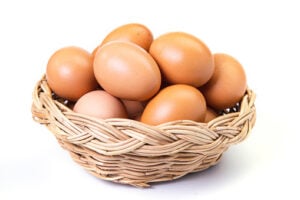[ad_1]
 About a year ago, I was engaged in an ongoing, weeks-long conversation with my then-girlfriend that went something like this.
About a year ago, I was engaged in an ongoing, weeks-long conversation with my then-girlfriend that went something like this.
“Can you believe it?” she’d say, having just gotten back from the store, “Egg prices have doubled! Anyhow, I got two dozen, let’s make omelettes!”
A few days later, she’d burst in the door with another armload of eggs. “They’re up another quarter a dozen! Oh well, nothing we can do about it. Get scrambling!”
“We could eat something else for a while,” I would mumble timidly. “Pasta sounds good.”
“What’s that, hun? Couldn’t hear you, I’m off to the supermarket, got to pick up some more eggs!”
Whatever monetary loss we suffered because of heightened egg prices was surely offset by the entertainment value of complaining about high egg prices.
Of course, inflation was high in late 2022 across a swath of the economy. Even so, the rise in egg prices was particularly precipitous. What was going on?
Industry experts offered various explanations. Bird flu apparently ravaged the nation’s supply of egg-laying hens in 2022, leading not only to direct losses but also to many hens being culled as a preventative measure. This avian flu epidemic supposedly coincided with peak consumer demand headed into the holidays, when consumers tend to bake more often, and as price-conscious buyers turned to eggs in lieu of higher cost proteins (meat) that remained expensive compared to eggs even as egg prices surged. In other words, the price eggsplosion (sorry, I had to) was simply a matter of supply and demand driven by external forces.
Such market factors no doubt had a good deal to do with why egg prices shot up in 2022. But what if something more insidious was going on? Could it be that, recognizing some good excuses to blame it on, egg suppliers took advantage and colluded to gouge consumers and boost profits, as at least one farmer-led advocacy group has since claimed?
Some precedent now indicates that nefarious corporate scheming may indeed be possible within the U.S. egg market. On November 21, 2023, a federal jury in the Northern District of Illinois delivered its verdict finding that the two largest domestic egg producers, Cal-Maine Foods Inc. and Rose Acre Farms Inc., together with two egg-industry trade groups, conspired to reduce supply in order to artificially drive up the price of eggs.
Specifically, the jury found that the conspiracy was effectuated by reducing the American supply of laying hens and by exporting eggs to disfavor the domestic market. Although liability has been established, the same jury will reconvene starting on November 29 to determine the appropriate amount of damages.
Notably, this lawsuit was not about egg prices in 2022. Rather, this suit was originally filed way back in 2011. The jury found that this eggs-ploitation (really, I can’t help myself) took place between October 2004 and December 2008.
This case demonstrates that the domestic market for eggs is vulnerable to manipulation. It also goes to show that producers really can be held accountable for unreasonable restraints on trade which violate federal antitrust laws — especially since two previous price-fixing cases brought by grocery stores and other direct purchasers of eggs failed.
Perhaps the recent verdict has certain members of the egg industry shaking in their boots, given that similar (albeit possibly legally distinct) behavior seems to have taken place in 2022. Yet, in light of the decade-and-a-half window between the end of the proven misconduct and the imposition of legal liability, with inevitable appeals still on the horizon, perhaps the threat is too distant to have any meaningful deterrent effect on today’s corporations.
“Justice delayed is justice denied,” according to a legal maxim with deep historical roots. We don’t put many of our treasured legal maxims into actual practice, however, and we’re sure not at risk of effectuating this one anytime soon based on the recent result in the egg price-fixing case.
Don’t worry yourself though: I’m making a mental note to follow up on this story sometime around the end of 2037 and will fill you in accordingly. We’ll get to the bottom of this.
Jonathan Wolf is a civil litigator and author of Your Debt-Free JD (affiliate link). He has taught legal writing, written for a wide variety of publications, and made it both his business and his pleasure to be financially and scientifically literate. Any views he expresses are probably pure gold, but are nonetheless solely his own and should not be attributed to any organization with which he is affiliated. He wouldn’t want to share the credit anyway. He can be reached at jon_wolf@hotmail.com.
[ad_2]




